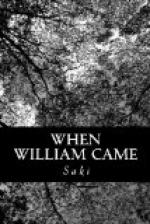on. “I was in these parts many years ago,”
explained the hostess, “when my husband was alive
and had an appointment out here. It is a healthy
hill district and I had pleasant memories of the place,
so when it became necessary, well, desirable let us
say, to leave our English home and find a new one,
it occurred to me to bring my boys and my little girl
here—my eldest girl is at school in Paris.
Labour is cheap here and I try my hand at farming
in a small way. Of course it is very different
work to just superintending the dairy and poultry-yard
arrangements of an English country estate. There
are so many things, insect ravages, bird depredations,
and so on, that one only knows on a small scale in
England, that happen here in wholesale fashion, not
to mention droughts and torrential rains and other
tropical visitations. And then the domestic
animals are so disconcertingly different from the
ones one has been used to; humped cattle never seem
to behave in the way that straight-backed cattle would,
and goats and geese and chickens are not a bit the
same here that they are in Europe—and of
course the farm servants are utterly unlike the same
class in England. One has to unlearn a good deal
of what one thought one knew about stock-keeping
and agriculture, and take note of the native ways of
doing things; they are primitive and unenterprising
of course, but they have an accumulated store of experience
behind them, and one has to tread warily in initiating
improvements.”
The Frenchman looked round at the brown sun-scorched
hills, with the dusty empty road showing here and
there in the middle distance and other brown sun-scorched
hills rounding off the scene; he looked at the lizards
on the verandah walls, at the jars for keeping the
water cool, at the numberless little insect-bored
holes in the furniture, at the heat-drawn lines on
his hostess’s comely face. Notwithstanding
his present wanderings he had a Frenchman’s
strong homing instinct, and he marvelled to hear this
lady, who should have been a lively and popular figure
in the social circle of some English county town,
talking serenely of the ways of humped cattle and
native servants.
“And your children, how do they like the change?”
he asked.
“It is healthy up here among the hills,”
said the mother, also looking round at the landscape
and thinking doubtless of a very different scene;
“they have an outdoor life and plenty of liberty.
They have their ponies to ride, and there is a lake
up above us that is a fine place for them to bathe
and boat in; the three boys are there now, having their
morning swim. The eldest is sixteen and he is
allowed to have a gun, and there is some good wild
fowl shooting to be had in the reed beds at the further
end of the lake. I think that part of the joy
of his shooting expeditions lies in the fact that
many of the duck and plover that he comes across belong
to the same species that frequent our English moors
and rivers.”




